Information about Corona Virus/COVID-19 is constantly changing and updating, with new data surfacing. Numbers used in this report are as accurate as possible as of 12:00 p.m. on Friday, March 13, 2020.
Tuesday afternoon, March 10, I sat down with Dr. John Meigs of Bibb Medical Associates to discuss the corona virus and its potential impact on Bibb County. Dr. Meigs has been practicing Family Medicine in Centreville for decades. He is a former President of the American Academy of Family Physicians, and is currently the President of the Medical Association of the State of Alabama.
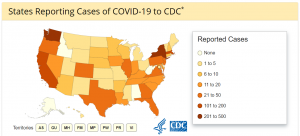
When we spoke on Tuesday, Alabama was one of a handful of states that had not yet confirmed any COVID-19 cases, including Mississippi, which announced its first confirmed case Wednesday night at Forest General Hospital in Hattiesburg. As I write this – information is constantly changing – there is now the first confirmed case in Alabama, in Montgomery. Rumors also run that a case has popped up in Huntsville/Madison County in north Alabama, and possibly two or more cases in Birmingham.
What is COVID-19, a.k.a. the “corona virus” that is circling the globe? According to the World Health Organization (WHO), “Coronaviruses (CoV) are a large family of viruses that cause illness ranging from the common cold to more severe diseases such as Middle East Respiratory Syndrome (MERS-CoV) and Severe Acute Respiratory Syndrome (SARS-CoV). A novel coronavirus (nCoV) is a new strain that has not been previously identified in humans.”
COVID-19 was discovered in the Wuhan province of China in December, 2019 (thus the “-19” designation) and is by definition a “novel corona virus” that it is said transferred from bats to humans, possibly in a crowded marketplace in one of the most densely populated areas on Earth. Wuhan, China, is home to over 11 million people. That’s roughly twice the population of New York City.
Because it is new to humans, no one has immunity to it. And it is highly contagious. “In about 88% of cases, it presents like a cold. About 12% of them are either serious or critical,” Dr. Meigs said, “If you’re one of those that’s got it, it’s pretty serious [to you].” He also said that compared to flu numbers, it’s a very small portion of the population that is contracting corona. In the United States alone, roughly 20,000 people die from flu each year. This does not mean we should ignore corona or assume it’s not as dangerous as flu. While it is so far roughly 2% fatal, it is extremely contagious. If you are directly exposed, you will likely get it.
“The death rate is about 15% if you’re over 80 [years old]. Most of the serious illness has been in those over 60. As they get younger it’s been pretty mild,” Meigs said.
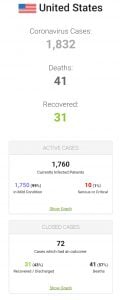
As of today, the updated numbers of cases in the United States indicates that only 10 active cases are serious or critical condition. This with almost 1,800 cases active. What of inactive cases, or cases that have had some resolution? 72. Total. With 41 deaths compared to 31 who recovered and are considered to no longer have the virus, it seems recovering from COVID-19 takes a lot longer than it does to die from it.
“We call this a ‘novel’ corona virus. … Most of these viral infections stay in a particular species. … It’s a little rare for it to jump from one species to another,” Meigs began, “Usually, when it makes that jump, it’s pretty severe because nobody’s got any immunity. Nobody’s been exposed to it before. It’s brand new.
“This is in the same family of viruses that caused the SARS epidemic, 12 or 15 years ago. Matter of fact, the name of this virus is now SARS-Corona-virus-2. SARS-CoV2 is the official name of the virus.”
SARS being Severe Acute Respiratory Syndrome, we can understand that this is an airborne disease. It gets in your lungs, and can cause pneumonia. Pneumonia can be deadly, and can cause long term respiratory system damage.
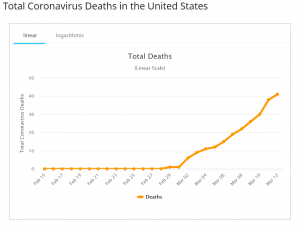 While Dr. Meigs doesn’t disregard concern over COVID-19, he does feel people are hitting levels of panic that are perhaps uncalled for, in his opinion: “Years ago, we had the bird flu jump from chickens to humans. Forty years ago we had swine flu. When a disease jumps species, usually it’s a real severe illness. And usually as it circulates, it tends to moderate. Now, this one’s brand new. We don’t know what it will do, but based on previous models, probably over time, it will moderate a little bit. … We think [the death rate] will go down, because we think the denominator of folks that are exposed is going to get larger. The death rate with flu is like 0.1%. Some people are predicting that the death rate of this SARS-2 will eventually get down in that kind of range. It doesn’t mean we should totally ignore it…It is highly contagious. But, it’s a proportional thing.”
While Dr. Meigs doesn’t disregard concern over COVID-19, he does feel people are hitting levels of panic that are perhaps uncalled for, in his opinion: “Years ago, we had the bird flu jump from chickens to humans. Forty years ago we had swine flu. When a disease jumps species, usually it’s a real severe illness. And usually as it circulates, it tends to moderate. Now, this one’s brand new. We don’t know what it will do, but based on previous models, probably over time, it will moderate a little bit. … We think [the death rate] will go down, because we think the denominator of folks that are exposed is going to get larger. The death rate with flu is like 0.1%. Some people are predicting that the death rate of this SARS-2 will eventually get down in that kind of range. It doesn’t mean we should totally ignore it…It is highly contagious. But, it’s a proportional thing.”
Coughing, sneezing, and fecal shedding (contaminated stool) are ways that COVID-19 can spread, Meigs said. Typically it’s a droplet from a cough or sneeze that causes the spread. Generally, someone will get the contagion in their eyes, nose, or mouth, and will wind up with an upper respiratory infection. He added, “Now, if you’re a smoker with bad lungs, or a diabetic, and it gets down in your lower respiratory track, you can get pneumonia, you can get respiratory failure, or you can die. But, 88% of folks with this disease so far, had a cold.”
What is the treatment for COVID-19?
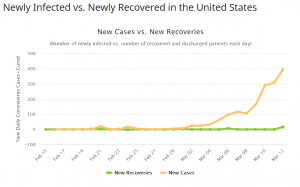
“There’s not one,” Meigs said flatly. “They’re working on a vaccine, and within the next month they’ll probably begin Phase 1 testing.” Vaccines can take a long time to test for safety and effectiveness. “You’re looking at a year and half probably before it’s available.
“In general, the way you protect yourself from this, or flu, or any of these other respiratory diseases: you wash your hands, you cover your cough, if you’re sick and running a fever, stay at home – don’t go spreading your disease everywhere, you should get plenty of rest, and eat a good healthy diet. We do know that people that are sleep deprived, ill and stressed, are the ones that are going to get sick, and are going to get sickest.”
“Nobody needs to go out and buy a bunch of masks. The people who need to wear a mask are the ones who are sick. If you’re sick and need to get out, you wear it to protect everybody else. You don’t do a whole lot of good by wearing a mask to keep from catching it. Now, healthcare workers, when you’re working with people who are really sick, those people will want to take some extra precaution.”
N-95 (or N-99 masks) can protect the wearer from inhaling contagion – if it is properly fitted, but will not keep a cough or sneeze from your eyes, and will not protect from other contact by touching things. These respirator type masks are to protect the user. The surgical masks that most people wear are to protect others from the person wearing them, and will do nothing to protect the person wearing the mask.
The N-95 masks are not only mostly sold out, but have gone up in some instances 1000% or more in price due to the shortage.
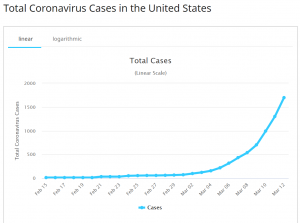 Dr. Meigs also addressed the rumor going around that corona will die off once the temperature outside climbs high enough. This is a myth. “You hope it will die down some as we get into the warmer months. The winter is our peak flu season,” he said, “but you see people with the flu in June and July, just not nearly the numbers we see this time of year. If we’re lucky, as we move on it should slow down.”
Dr. Meigs also addressed the rumor going around that corona will die off once the temperature outside climbs high enough. This is a myth. “You hope it will die down some as we get into the warmer months. The winter is our peak flu season,” he said, “but you see people with the flu in June and July, just not nearly the numbers we see this time of year. If we’re lucky, as we move on it should slow down.”
“Now is not the time to take a cruise,” he added, “and I’d stay out of the Middle East, Europe, and Asia.”
Impact in rural areas vs urban areas
“The fact that we’re less densely populated, probably will mean less effect here than in cities,” Meigs replied, “But again, if you get a sick person in a crowd, whether it’s in Wal-Mart or at church or a basketball game…somebody can spread it.”
But, it’s not the zombie apocalypse?
“No, we’re not densely populated here. If you want to keep yourself safe, you want to stay six feet away from everybody. That’s probably easier to do here than it would some other places.”
“If you’ve got a cold, with mild symptoms, you don’t have to go to the doctor. You’re going to get well in a week, or if you come see me you’re going to get better in seven days,” Meigs joked about the common cold, “but, if you’ve got something serious going on…pneumonia, fever, short of breath, chest pain and such…yeah, you need to go get checked out. But, if you’ve just got a runny nose and a hacking cough, I wouldn’t go to the emergency room just because I don’t want to expose myself to all those other folks in there that are sick.”
What if it gets to Bibb County?
“If someone comes back from an area where there is SARS-2 (COVID-19), out of an abundance of caution, even if they aren’t sick, they ought to self-quarantine themselves for a couple of weeks,” Meigs said of the possibility of seeing cases of Corona in Bibb County. “The incubation period on this … the average length from exposure to illness is five days. The range is four to twelve. So that’s why they say stay home for two weeks. If you haven’t gotten sick in two weeks you probably aren’t going to get sick.”
Further, what if it gets in our schools? I had a chance to speak to Superintendent of Bibb County Schools Duane McGee on Thursday. According to McGee, the State Department of Public Health is not forcing any closures (at the time we spoke), but will support any system that decides to close. The direction they have been given as of March 12, was that if a student or teacher was tested positive, the school they were in would be required to shut down and disinfect for 2-3 days while investigation was conducted and a decision made thereafter to close for up to two weeks if needed, depending on the likelihood that others could have been infected. There is no standard in place for the event of a household member of a student or teacher testing positive.
From what we’ve heard from Dr. Meigs, and the new info coming out from CDC and WHO, it would seem advisable to close down for two full weeks if any teacher, student, or family member of either tested positive. *writer’s opinion*
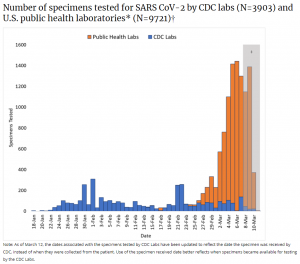 We also know that part of the issue of seeing low numbers reported most places has been that not many tests were actually being run in the United States. While some countries like Italy and China ran over 10,000 tests per day, the U.S. as of yesterday had only recently passed that number as a total tested. That is rapidly changing, however, as private laboratories have been opened up as approved test centers, to ease the case load on the CDC. This will make the system more efficient, but is also likely to drive numbers up when considering cases of infected persons.
We also know that part of the issue of seeing low numbers reported most places has been that not many tests were actually being run in the United States. While some countries like Italy and China ran over 10,000 tests per day, the U.S. as of yesterday had only recently passed that number as a total tested. That is rapidly changing, however, as private laboratories have been opened up as approved test centers, to ease the case load on the CDC. This will make the system more efficient, but is also likely to drive numbers up when considering cases of infected persons.
Actual Impact in Bibb?
As of right now, no one here has corona virus/COVID-19/SARS-CoV2. We do, however, have a case of toilet paper in each of our homes. I’m assuming this, as there is none in Wal-mart as of this morning. I’ve also been told that other shelves around town are emptying as people are beginning to heard that Corona is officially in the state of Alabama.
We can expect to see an economic impact everywhere. Not just on the international stage of the New York Stock Exchange – where yesterday the Federal Reserve sent $1.5 Trillion dollars in an effort to mitigate the dip being cause by corona and hopefully avoid a full-on recession – but at local levels as well. It is likely that some stores will close down temporarily. Some colleges are already closing.
The University of Alabama has declared that all students will go to online classes until at least April 6. The absence of students causes an economic impact on Tuscaloosa. Small stores, services such as restaurants and delivery, ride-share (Uber and Lyft), and other businesses will feel it hardest locally. As people are forced to stay home from work, a ripple effect will have everyone feeling the impact in some way, if only in lowering your retirement account balance along with your savings account.
The Bibb Voice will keep its collective ear to the ground and post relevant updates as possible. In the meantime, remember to wash your hands well, cover your cough with your elbow, avoid touching your own face, and avoid touching other people if at all possible. If we all stay cautious, it’s possible we could avoid the need to panic.
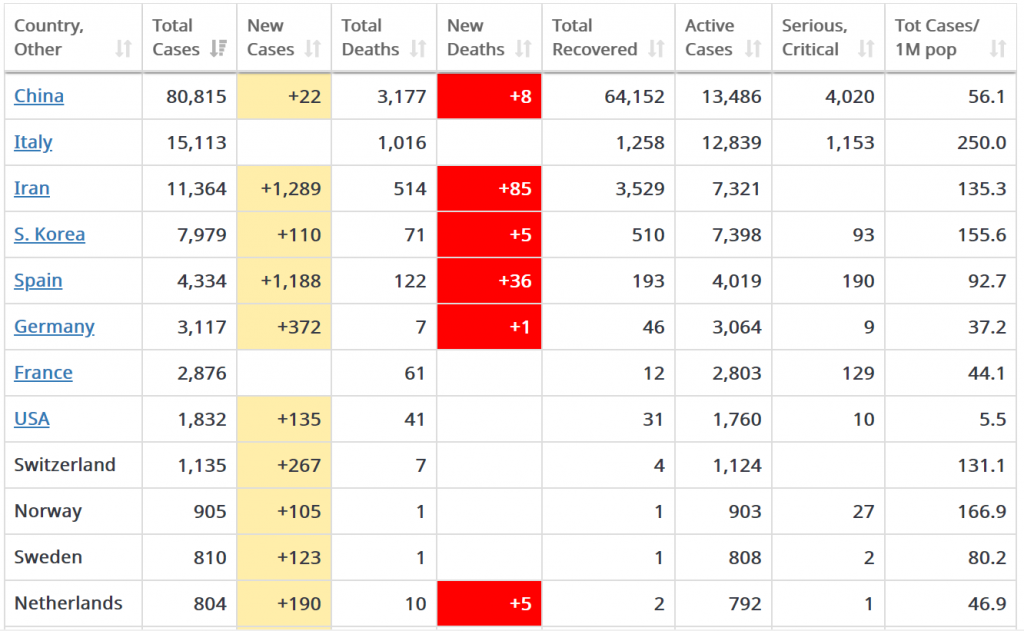


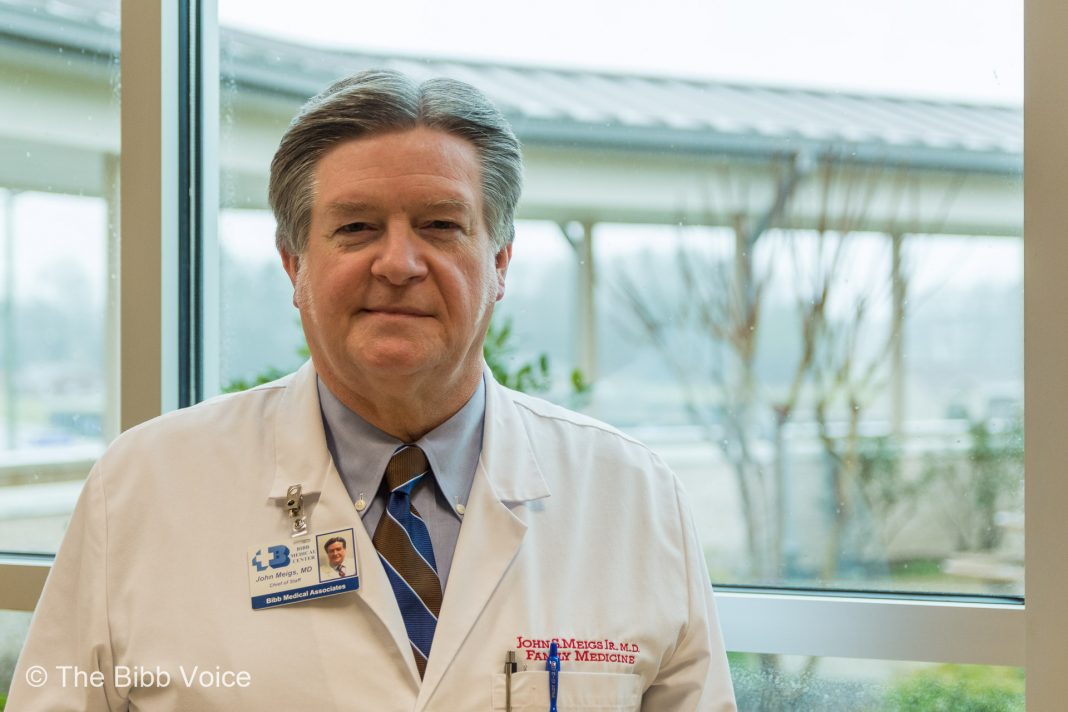




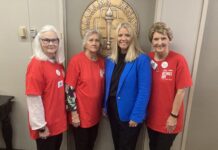









Jeremy, Thank you so much for keeping us informed on bibbvoice.com. I truly appreciate all your articles, especially your article, “Corona Concerns for Bibb: Dr. John Meigs”. Please continue to share your writing abilities and know we are very blessed to have you back in Bibb County. Looking forward to your future articles.
[…] a cold or respiratory infection stay at home. Take the time to read the recommendations offered by Dr. John Meigs in this article: click […]